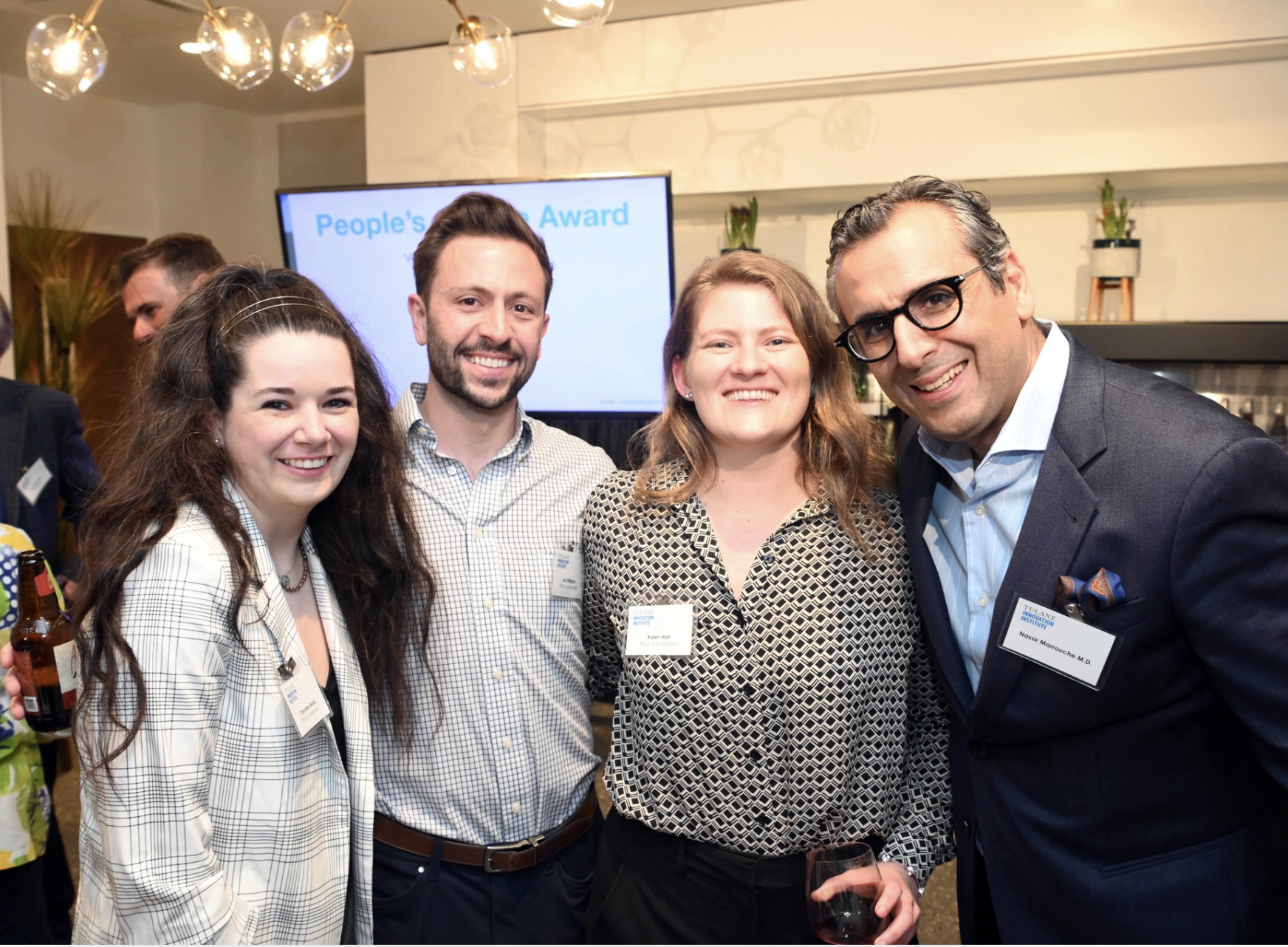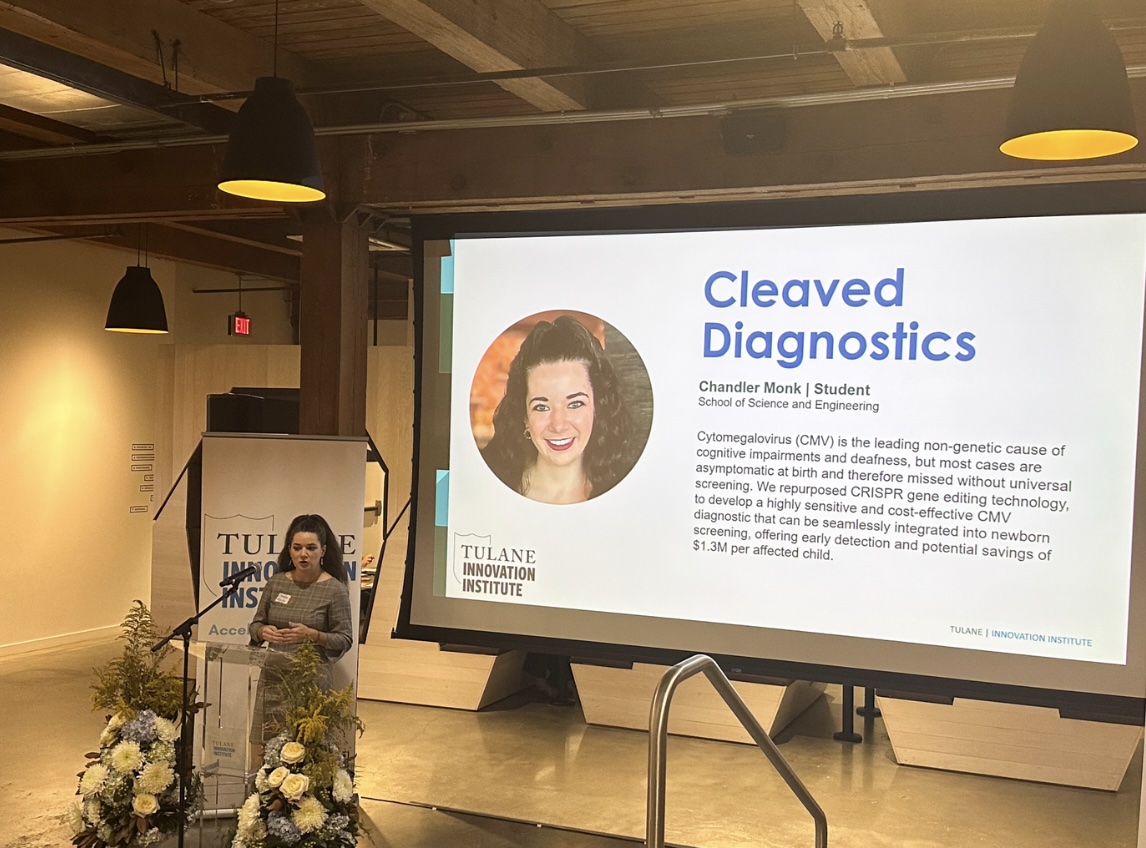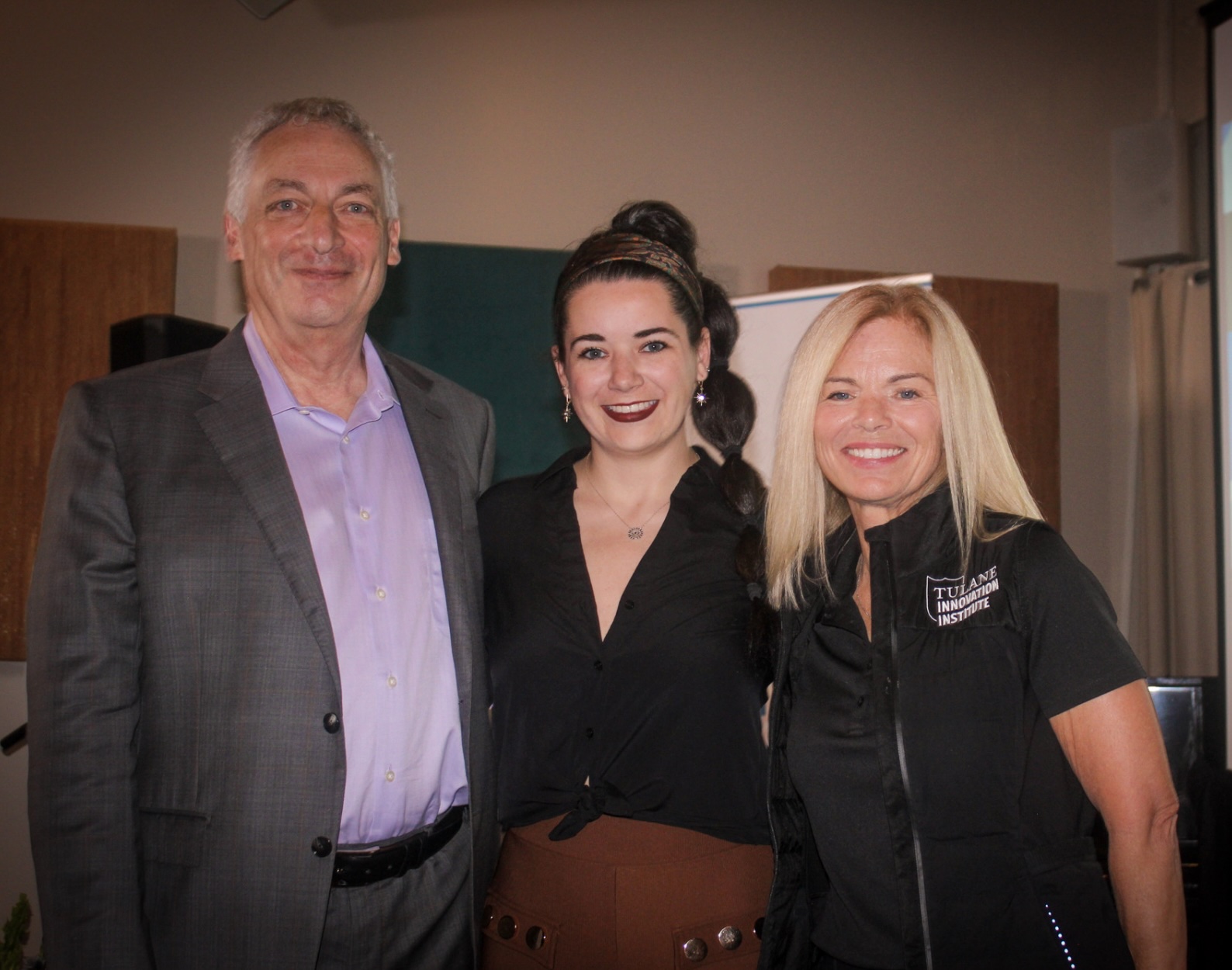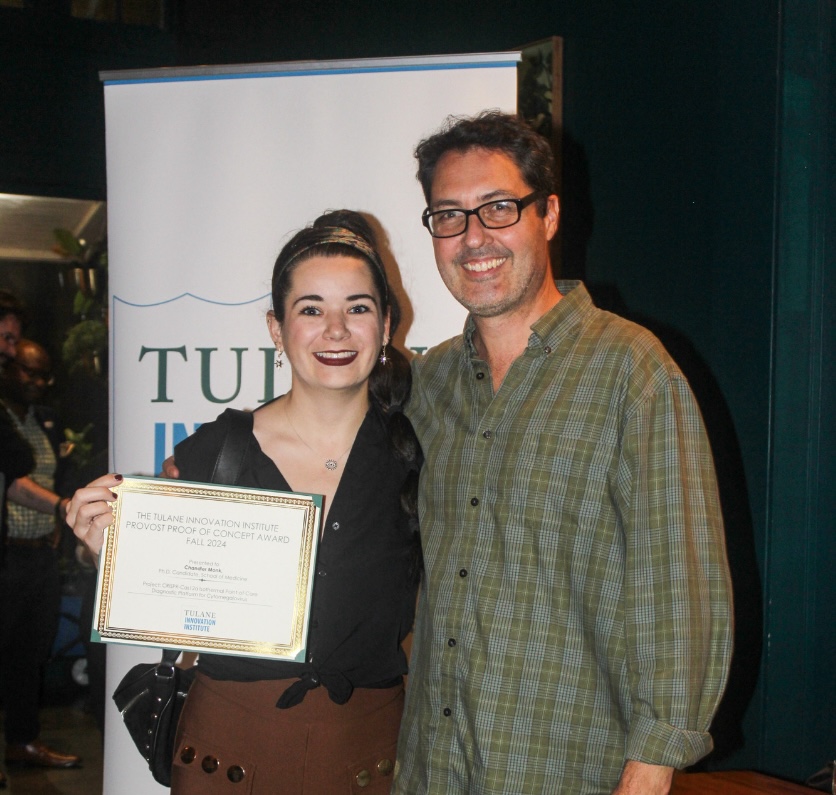Chandler Monk advances Cleaved Diagnostics with a $50K grant from the Provost's Proof of Concept Fund and additional support from Tulane Innovation Institute programs

Pictured from left to right are Chandler Monk, Leo Williams, and Kalen Hall, co-founders of the biotech startup Informuta, alongside Dr. Nassir F. Marrouche at the first Open Medical Innovation Challenge (Open MIC) Night.
Chandler Monk, a Ph.D. candidate at Tulane University, founded Cleaved Diagnostics, a company focused on improving the detection of congenital CMV. She has leveraged Tulane’s Innovation Institute programs to bring her research closer to commercialization, including receiving a $50,000 grant through the Provost’s Proof of Concept Fund in Fall 2024 to advance testing of her diagnostic platform. Monk also sharpened her entrepreneurial skills at the Open Medical Innovation Challenge (Open MIC) Night, where participants pitch solutions to pressing health and wellness challenges, and through the National Science Foundation’s I-Corps program, known for its focus on customer discovery and value proposition research.
In a recent interview, Monk shared how the COVID-19 pandemic shaped her perspective on translating research into clinical applications and how her passion for maternal and neonatal health drove her focus on CMV detection. She also reflected on the lessons learned through early setbacks, emphasizing the value of perseverance and continuous growth as an entrepreneur.
What inspired you to start Cleaved Diagnostics based on your research?
When I started my PhD in Bioinnovation, I knew I was interested in entrepreneurship and, ultimately, the goal, but I had no idea what that might look like 4 years later. The idea for Cleaved may not have happened if it were not for the COVID-19 pandemic. Hospital labs were overwhelmed, and many virology researchers, our lab included, were suddenly thrust into large-scale studies that we may not have been prepared for but knew were necessary because of the state of the world during that time. It was an eye-opening and career-changing time for me. While many were working from home, I was in the lab working extremely long days but enjoying every second of it because it gave my research purpose, it gave me purpose during a difficult time. The line between research and clinical impact began to blur even further because I was rapidly witnessing benchtop-to-bedside science I had never experienced before. I also quickly realized that no one else would care more or have the passion necessary to commercialize a product than someone who poured their life into the research behind it. I had the chance to work on a similar CRISPR diagnostic platform for COVID-19, and after the pandemic died down, we soon realized this may be the missing piece for congenital CMV detection as well, and from that, Cleaved was born.
What sparked your passion for tackling cytomegalovirus (CMV) detection?
When I started grad school, I set out to tackle a research question that mattered and was probably often overlooked by others: women’s, children’s, and maternal health. I also knew I work best when I have a greater purpose behind my research. After setting this intention, on the first day of my master’s at Tulane for Microbiology and Immunology, Dr. Kevin Zwezdaryk, my current advisor, came to talk about his research in herpesviruses. More specifically, CMV’s impacts on newborns cause lifelong hearing and neurocognitive deficits. I was shocked because I had never heard of it, but it seemed to be a significant issue. I instantly felt like it wasn’t happenstance; this was aligned with my mission of overlooked maternal and neonatal health, where I could combine my passion for virology and provide purpose and passion in my research.

Chandler Monk at Open MIC Night, Fall 2024
How has participating in programs like Open MIC Night helped your startup journey?
Open MIC night has a special place in my heart because it was the first time Cleaved was tangible as a viable business idea around 2 years ago. It was also a sharp but necessary learning experience because my first attempt two years ago was also a failure. Regardless of messing up my pitch that night, I was incredibly proud of myself because the failure did not deter me from getting feedback that night and vowing that I would be back. When I returned 2 years later, Cleaved was more than just tangible, and I was far better prepared. Winning Open MIC marked growth as an entrepreneur for me; it gave me confidence that I was on the right track and taught me in real time that an incredibly integral part of entrepreneurship is to let failure teach me rather than allow it to discourage me.
How has the Regional I-Corps program influenced your entrepreneurial journey and the development of Cleaved Diagnostics so far?
Going into the I-Corps program, I thought I had a very good grasp on the full extent of why universal screening for CMV at birth is not more widely implemented. The customer discovery during this taught me that the problem is far more nuanced than I realized. Much of newborn disease screening is done at the state level by state-funded labs, so for widespread universal screening implementation for CMV, it must be mandated and funded by the state for adequate adoption. For it to be mandated by the state, it must be written into the state legislature, and even then, if it is written into law like it is in Louisiana without funding attached, then there is little to no way to enforce the law. The interest and push for CMV universal screening is essentially there among experts, but the payors and decision-makers in State legislature are mainly unaware of CMV. All of this refined my approach to what is truly necessary for commercialization and adoption.

Pictured from left to right, Tulane University Provost Robin Forman with Chandler Monk and Kimberly Gramm, Chief Innovation & Entrepreneurship Officer at Tulane Innovation Institute.
Congratulations on being a Provost’s Proof of Concept Fund recipient! How do you plan to use the funding, and what do you hope to achieve with it?
We are extremely excited because this allows us to receive 500 neonatal dried blood spot samples from Minnesota to test our diagnostic efficacy further in parallel with the current system. This will further strengthen our relationship with Minnesota’s universal screening program for CMV and allow us to move towards commercialization in this beachhead market. With this funding, we are also taking steps to simplify and improve our system to work at near room temperature in a single rapid hands-off reaction. This would expand our test to being a platform diagnostic that can replace the common standard-of-care practices with a faster, cheaper, and more sensitive solution that requires less machinery and expertise.
Starting a company while pursuing a Ph.D. is no small feat. What advice would you give to other Ph.D. students who want to pursue entrepreneurship?
Start in small steps early: earlier than you think. I kept pushing back from starting my venture because I felt I wasn’t ready, so I first began by treating it like a hobby in the background while I was bogged down with my PhD work. Around 4-5 years ago, I started listening to startup and business podcasts in the background while doing my lab experiments. This allowed me to learn without overwhelming me while I was busy with my PhD work and kept it light and fun rather than further draining me. Recently, I have tried to balance entrepreneurship with my PhD work by ensuring that the mental load is shifted to only one side a day. For example, if I did something mentally draining that day in the lab, I would do something mindless and monotonous to push the business forward that would not be as taxing. If my lab work is monotonous that day, I will work on something that takes a bit more mental focus for Cleaved. Lastly, it helps me to destress my environment while building Cleaved, so instead of a dark library, I often sit at a local coffee shop outside on Magazine Street and enjoy people-watching on a beautiful day while I work.
How do you envision Cleaved Diagnostics growing over the next five years?
My biggest goal for Cleaved in the next five years is to become the market leader in congenital CMV testing as states implement this on their newborn screening panels. Several states, including Minnesota, New York, Connecticut, Arizona, and six providences in Canada, have implemented universal screening or are conducting pilot studies to do so soon. In the coming years, we plan to meet these states with a better solution for congenital CMV screening while they are implementing changes to the standard of care. While this is our primary goal and beachhead market, I do not want to lose sight of the broader scope of this technology. After finding a foothold in the market, we plan to expand to other pathogens and diseases we have already proven can also be detected by our platform.

Chandler Monk and Dr. Kevin Zwezdaryk
